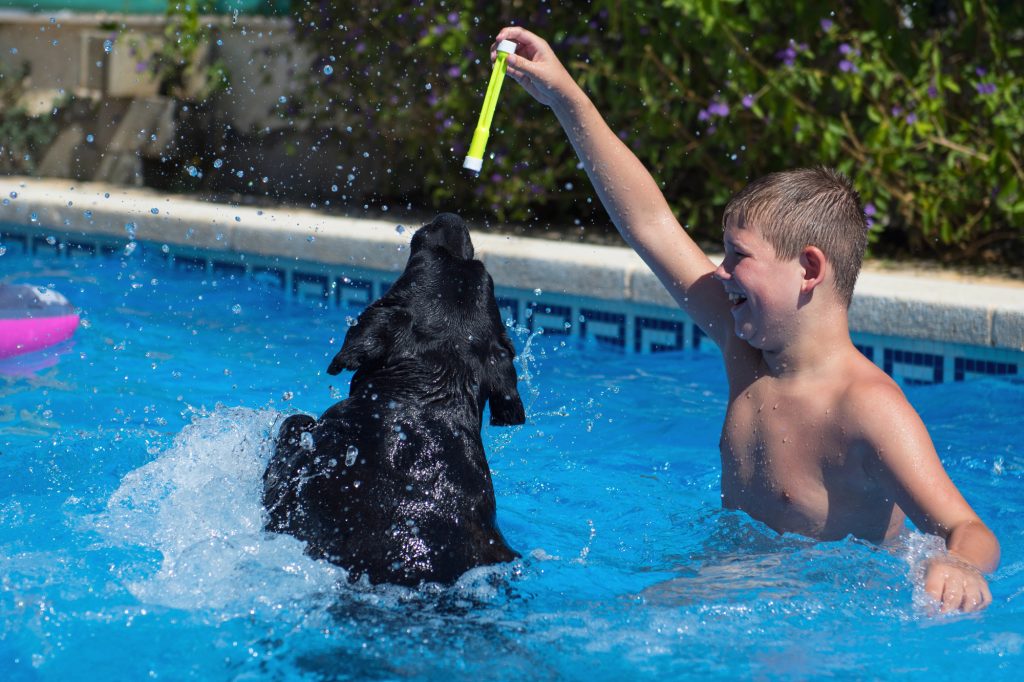
Summer is here, and the hot weather could spell danger to furry family members. While you and your dog want to spend time in the great outdoors where unlimited adventures await, dogs can overheat easily because they have limited sweat glands. Luckily, playing in the water is an easy way to keep your dog cool. Nothing beats the look of pure joy on your four-legged best friend’s face as it frolics in the nearest lake, river, stream or puddle.
Warmer weather means watching for signs of heat-related illnesses, including heat exhaustion and heatstroke. Early intervention is crucial if your dog is overheating. Another dog safety essential is a Halo Collar, which provides an invisible GPS fence that encourages your dog to stay within your set boundaries wherever you may roam.
Explore our tips on keeping your dog cool in the summer with safe water activities and other outdoor fun. We’ll also cover the importance of hydration and sun protection, cooling products geared for canines and how to recognize the signs of overheating and heatstroke to keep your four-legged best friend safe this season.
Decoding Your Dog’s ‘SOS’: Is Your Pup Overheating?
Dogs have difficulty regulating their body temperature because they don’t sweat like people do. Instead of having sweat glands throughout its body, your dog only has sweat glands on its paw pads. Primarily, it can only stay cool on a hot day by panting. It pants to lower its body temperature and dissipate heat from its lungs. While panting, your dog needs plenty of cool water to keep its airways moist.
A dog panting heavily but showing some fatigue and no desire to play may be mildly overheated. You can cool down your dog using a wet towel or splashing cool water on its body and giving it cold treats. However, signs your pup’s heat-related illness has gone beyond mild include:
- Excessive panting
- Extreme drooling
- Labored breathing or gasping
- Severe lethargy and weakness
- Inability to stand
- Vomiting or diarrhea (sometimes bloody)
- Seizures
Severe heat exhaustion and heatstroke are considered medical emergencies. If you suspect you have a severely overheated dog:
- Immediately move it to a cooler location, such as into the shade, near a fan providing a cooling breeze or to a room with air conditioning.
- Check your dog’s body temperature rectally — anything above 103 degrees is abnormal and above 106 is dangerously high.
- Cool your dog with wet towels on its belly, neck and armpits or douse it with cool water to decrease body temperature.
- Don’t use cold water, ice cubes or an ice pack, which can make your dog too cold too fast or cause its blood vessels to constrict, potentially causing it to go into shock.
- Don’t force your dog to drink water; it’ll drink when ready.
- Take your pup to the vet immediately after cooling your dog’s temperature.
Heatstroke can be fatal to your furry best friend. By staying aware of any signs of heat stress, following solid prevention tips and intervening early if you feel your dog is in distress, you can help keep your canine companion safe when it’s hot outside.
Dive In! Safe and Exciting Water Activities for Every Pup
Most dogs love the water, but some don’t. Even if your dog isn’t fond of water, you can still enjoy running along the beach together. However, take care when you run with your dog in the summer. As mentioned, avoid strenuous outdoor activities during the hottest part of the day. Consider these exciting water activities for dogs who love getting wet.
Related article: How to Run With Your Dog
Swimming
Swimming lets your dog exercise every muscle group while getting much-needed mental stimulation and having fun. However, be careful where you take your dog swimming. Avoid any water source with strong currents that could sweep your pup away or has blue-green algae, which can produce harmful toxins that damage your dog’s liver or even cause death.
Enhance safety in the water by utilizing a life jacket for dogs. Pair this with a Halo Collar and its GPS capabilities to let you know where your dog is at all times. These innovative collars undergo rigorous testing and are submersible in water up to 3 feet deep, so you can count on them to continue working even after getting soaked during a swim.
Sprinklers and Water Hose Fun
Transform your backyard into a doggy water park with various sprinkler types. Try oscillating sprinklers for a gentle, consistent spray or rotating sprinklers for unpredictable, exciting bursts of water. A simple garden hose can also provide some excitement and keep your pup cool. Engage your dog in a “chase the stream” game, or create a splash pad by punching holes in a garden hose and securing it in a loop.
Rest easy knowing that Halo Collar’s durable design withstands wet conditions, ensuring your dog’s safety and freedom during water play. This GPS-based collar is built to handle splashes, sprays and even full submersion, making it the ideal companion for your dog’s summer adventures.
Portable Doggie Pools
Pools for dogs offer a convenient way to keep them cool on a hot summer day. When selecting a portable doggie pool, choose the right size and material for your dog and its activity level. Ensure the pool’s depth doesn’t pose a drowning risk, and always supervise your pup’s playtime like you would a child.
Choose durable, puncture-resistant materials to withstand your pup’s nails and romping. If your dog likes extended pool time, periodically check the water to ensure it remains at an ideal temperature. Also, you should refresh the water regularly to maintain cleanliness.

Hydration Heroes and Sun Shield Superstars
While providing fresh water to keep your dog hydrated is always important, a steady supply of cool water is even more critical in the summer. It’s commonly recommended that a dog drink about 1 ounce of water per pound of body weight. However, this amount can differ based on your dog’s activity level. Heavy panting due to extreme heat will increase your dog’s thirst.
When participating in water activities, don’t assume your dog will or should drink the water available. Instead, always bring a water bowl and bottled drinking water to fill it.
Dogs with white coats or thin hair can get sunburned, just like a person. Keep them out of direct sunlight and in the shade as much as possible. While outdoors, use pet-safe sunscreen to protect sensitive skin from burns. Remember, you typically can’t share your sunscreen with your dog because it contains ingredients that can be toxic to a canine if ingested.
Sunscreen specially formulated for pets won’t contain zinc oxide or PABA. When in doubt, ask your veterinarian to recommend a product. Choose a waterproof sunscreen to ensure your pup’s sunburn protection doesn’t wear off during swimming or other water play.
Cool Gear for Canine Comfort
Overweight canines and dog breeds with double coats or flat noses may be more susceptible to overheating in warm weather. Consider these cool gear ideas:
- Cooling coats or vests. Worn like regular vests but designed to retain cool water, cooling vests help your dog beat the summer heat. These are easy to use and effectively cool your dog’s body, but they require regular re-wetting to maintain their cooling effect.
- Cooling mats. Perfect for lounging, a cooling mat typically contains a gel that stays cool without refrigeration while your dog lays on it. These mats don’t require water or electricity. However, they’re small, making it challenging to keep larger dogs cool. You may need to lay the mat across your dog’s bed initially to coax it to lie on the cool surface.
- Cooling bandanas. These work similarly to vests but are worn around your dog’s neck. They’re lightweight and easy to use but offer less cooling surface area than vests. You can also DIY an inexpensive version by wetting a regular bandana with cold water and placing it around your dog’s neck.
Other DIY options include frozen treats like homemade dog-safe popsicles, a bath towel wrapped around ice packs or frozen water bottles. These are simple, cost-effective alternatives to help your dog chill out and enjoy the summer safely.
Summer Adventures: Pro Tips From Halo Collar
Don’t exercise your pup during the hottest part of the day. Keep your dog indoors between 3 p.m. and 6 p.m., when the highest temperatures typically occur. Consider a gentle walk early in the morning before the heat becomes too unbearable, or wait until late in the evening when the sun’s rays aren’t beating down so harshly. If you’re using a Halo Collar, you can track your dog’s overall activity and well-being.
If you must have your dog out on a hot summer’s day, try to keep it out of direct sunlight and never leave it in a hot car. When walking, remain on cool surfaces to protect your dog’s paws from being burned by hot pavement. If you can’t avoid pavement, put some protective booties over your dog’s feet. Above all, know when it’s time to call it a day and take your pup indoors to rest under the cool breeze of a fan or air conditioning.
Don’t Just Beat the Summer Heat, Make a Splash With Halo Collar
Water play offers endless joy and numerous benefits for dogs, from cooling down to providing much-needed exercise. By exploring gear like cooling mats and vests and water activities utilizing sprinklers, hoses or pools, you can discover what your dog loves most. Keep your four-legged friend safe by taking the fun indoors to enjoy the cool air conditioning when the heat gets too much.
Equip your dog with a Halo Collar for a summer of safe, fantastic fun. Explore our website to learn more and give your pup the best summer ever.





